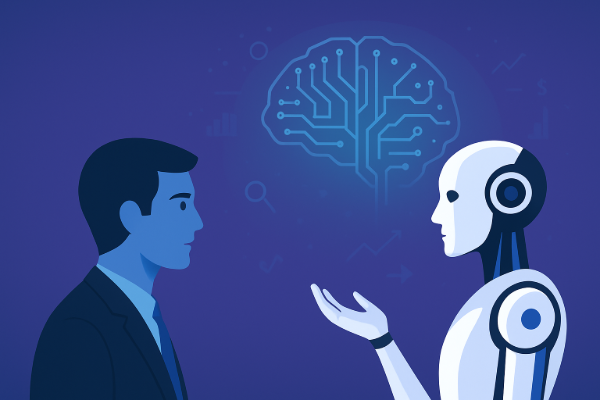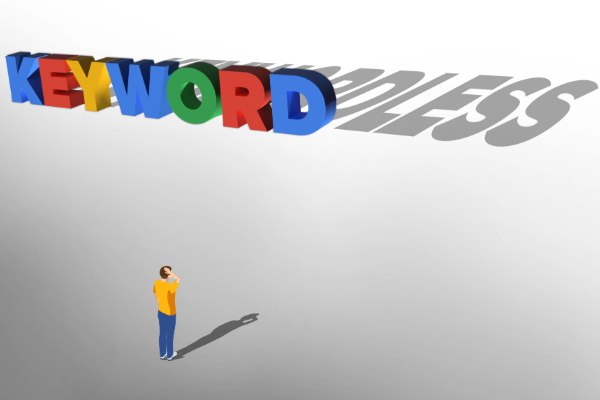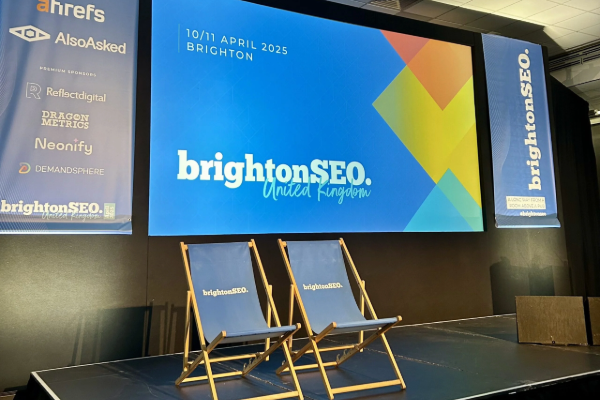Key Takeaways from brightonSEO: AI, Search & the Future of Content
With the rise of AI, brands are still balancing traditional SEO techniques whilst trying to stay relevant with changing customer search behaviours and the growing importance of LLMs. This month, the Organic Search team at Threepipe Reply attended Brighton SEO: Europe’s biggest SEO conference to learn more about what’s really happening, fresh new tools, workflows and ideas to help brands tackle these changes.
The day’s agenda brought a true feast, covering anything from paid media advanced tactics for social campaigns, the psychology of search and user journeys with practical AI usage building GPT’s that think like you, as well as AI automated workflows, to making GA4 work for SEO, and PR & citation,s including securing visibility in LLM-driven search. The afternoon continued with analytics strategy, CRO, and analytics tagging as well as how to increase conversion rates and site migration. Raising to light issues such as accessibility considerations in SEO and AI automated marketing teams, agentic checkout and ecommerce and bridging the gap between technical challenges and client KPI’s.
In this article, we’ll shed light on some of the key industry shifts and what brands need to do to prepare for what’s coming next to stay ahead of the curve.
Will AI Dominate? – Human-First Content Still Wins
Did you know 60,000 AI-written articles are published every day? With AI having grown in intelligence and being able to produce full articles in a matter of seconds, the question arises – will AI completely eliminate the need for human involvement when it comes to writing copy that is optimised for organic search performance as well as users?
The short answer is no. Will Slater’s talk on ‘Be more mixtape: Why you shouldn’t use AI to write’ revealed a crucial point: whilst AI can scale output, it lacks empathy, emotion, and lived experience, the things that build connection and trust. In fact, this theory was put to the test and results showed that 87% of human-written content outperformed AI for rankings and keyword coverage.
Despite this, Akash Hashmi’s talk on ‘AI for SEO done right – building brand-boosting tools’ proved AI can still be valuable in SEO when it comes to building brand awareness. Silke Vanbeselaere’s talk on Practical AI Usage ‘Building A GPT that thinks like your personas and writes like you’ explained that using AI to generate content and even to create brand personas to test how content performs on your customers means brands can get it right the first time.
Please reach out to us if you would like to find out more on how brands can leverage AI in their content or would like a demo.
Adapting to a new SEO era
If there’s anything we’ve learned from the ever-changing Google algorithms and rise of LLM’s it’s this: quality content trumps quantity every time. Martina Kolsch’s take on ‘Sense and nonsense texts on PLPs’ reinforced a well-known truth, that Google only values content that adds clarity and context, not keyword-stuffed filler.
Although this may be nothing new, Organic Search is shifting towards accessibility, storytelling, and user intent, not just structure. Chris Walsh’s talk ‘AI is changing search behaviour’ and Becky Simms’ ‘Why there? The psychology of search behaviour’ reinforced the idea of optimising for search intent. With users searching across ChatGPT, YouTube, TikTok, and Reddit for different reasons, understanding why they search is as important as where in order to tailor your SEO strategy accordingly.
This leads us to the topic of the hour: optimising for AI.
Optimising for AI Search
Vince Moreau’s talk on ‘AI Search is not the same as SEO’ produced a fresh take on how we see AI in the SEO world. AI search isn’t a new channel, it’s a new customer behaviour. In order to successfully adapt to this new search era, brands need to stop treating AI as a search algorithm to be ranked. Tom Capper’s ‘Measuring AIO impact: was anyone clicking anyway?’ made a vital point in understanding how LLMs bring value rather than treating them as just another search algorithm.
When analysing the behaviour of LLMs (such as ChatGPT & Gemini) studies show that they break queries into micro-intents and rebuild answers from trusted sources. This means that instead of fighting the algorithm for ranking, brands need to focus on being the brand AI cites.
To do this, SEO strategies must focus on:
- Entity & intent coverage – Making sure your content fully answers what people (and AI) want to know about a specific topic or brand.
- Topical clusters and context retrieval – Grouping related content together so search engines and AI can easily understand the bigger picture.
- Multi-format, “LLM-friendly” content – Creating content in different formats (text, video, images, data) that AI tools can easily find, understand, and quote.
To do this well, brands need to be testing for visibility within LLMs and search engines that their audiences use most. This means knowing who your audience is and where they like to spend their time, depending on what their intent is.
So, you’re going to need to measure the right metrics.
You are what you eat – analysing AI results
As expected, with the increasing use of AI, ensuring it can be tracked, measured and data-collected is vital to understanding where brands stand. Luckily, AI traffic is now measurable. Iryna Kutnyak’s talk on’GA + LLMs: smarter data analysis for better marketing decisions’ revealed brands can use GA4 with regex and custom UTM events to track LLM referrals and monitor performance across BigQuery for deeper insights. This new development will make it easier for brands to understand what’s working and what isn’t working in their SEO strategy and adapt accordingly to the upcoming shifts in the industry. However, Katie New’s ‘ You are what you eat: Stop feeding your reports rubbish data’ warned against using poor data and low effort when building these reports, as this will output an equally poor data result.
The importance of analytics done right doesn’t stop there, with Alan Lucas’ talk on ‘How to use analytics to improve form conversion’ reminding us that getting from clicks to conversion is all about how we choose to use the analytics tools and data at hand. This is just as important for CRO as Ninsiima Rukandema’s talk discussed ‘The power of qual and quant data to drive CRO results’, which highlights a universal truth, that investing in quality data continues to be at the heart of any SEO strategy.
A new dawn for Retail E-commerce
It wouldn’t be an SEO conference if we didn’t delve into agentic commerce. Killian Dunne on ‘Everything SEOs need to know about agentic commerce’ brought to light how AI is moving beyond the typical recommendation engines, and is now interacting with systems via APIs to handle searching, comparing, deciding and purchasing on behalf of users. For some these updates will not be surprising, but it does present a key opportunity for brands to quickly change and adapt to how their customers are shopping and searching.
Is SEO as we know it dead?
The final talk of the day, Mike King’s Keynote ‘The AI Search Playbook’ reiterated, search is entering a new era driven by AI-powered surfaces so old SEO rules no longer suffice. King emphasised information retrieval engineering as the next evolution of SEO, with less focus on ranking tactics and more on structuring content to be retrieved easily by AI systems.
Here’s what we’re taking away from this year’s brightonSEO:
- With the rise of AI search interfaces and fewer clicks to sites, brands & publishers risk visibility loss unless they adapt.
- The architecture of search has shifted: from “crawl → index → rank → click” to “query fan-out → sub-queries → content retrieval → answer/summary → brand/action”.
- Those who structure their content/data to be found and used by LLMs gain an advantage but relying purely on traditional SEO may make brands fall behind.
Organic Search has evolved and can no longer be viewed as a performance channel, but rather marketers need to see it as a brand channel in order to adapt. AI is not going to disappear, and brands need to learn to work with it, not let it take over. AI should support creative workflows, not replace them.
The next wave of SEO success will come from clean data, semantic structure, multi-intent coverage, and human-centric storytelling, not just keywords or automation.
If you’re unsure how to adapt your strategy for AI search and evolving user behaviour, reach out; we’d love to help identify where your brand could improve in this new landscape.












